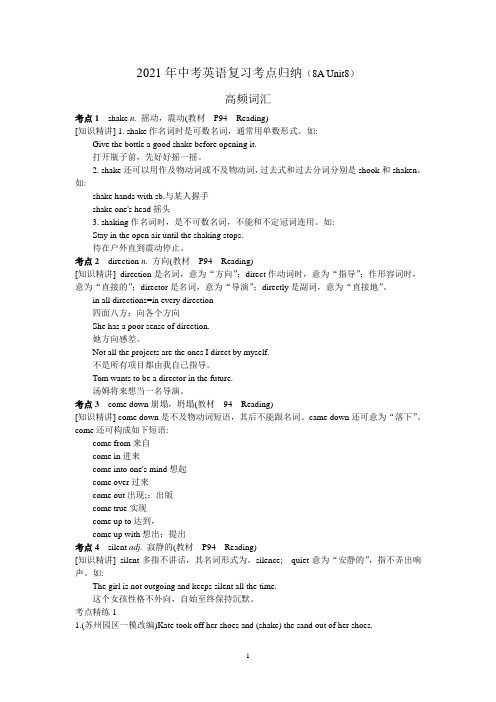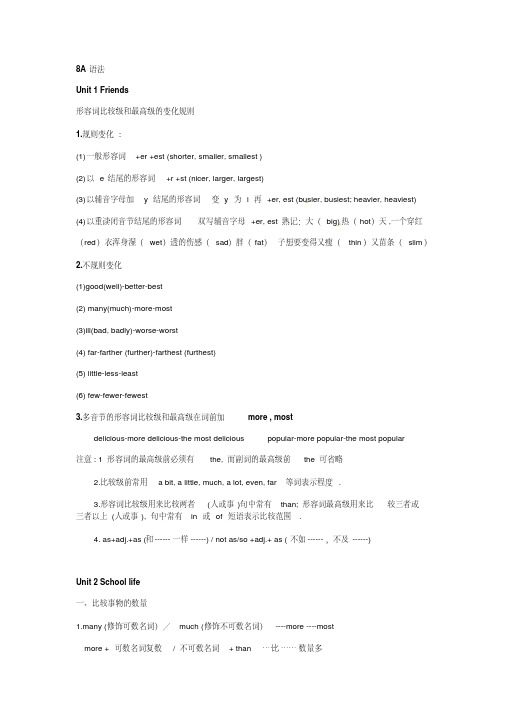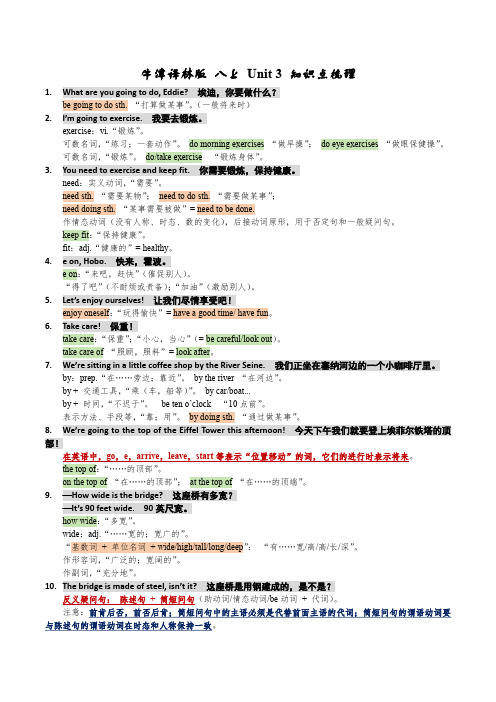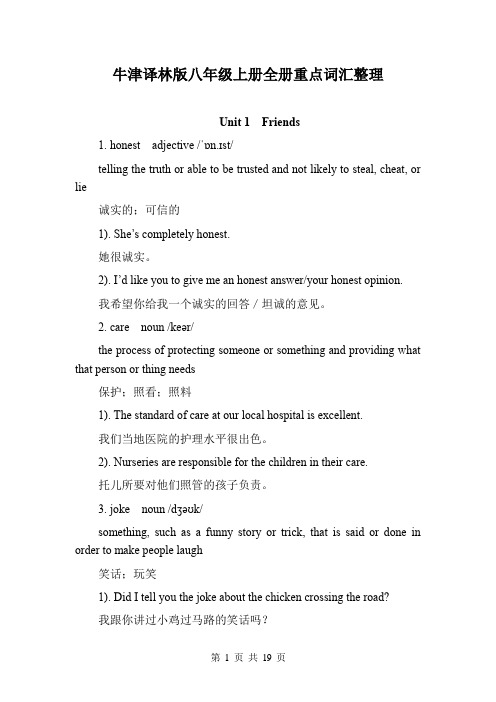整理牛津译林版八年级上册英语知识点归纳
2021年牛津译林版中考英语复习讲义(考点归纳及练习)(八年级上册 Unit8)

2021年中考英语复习考点归纳(8A Unit8)高频词汇考点1 shake n. 摇动,震动(教材P94 Reading)[知识精讲] 1. shake作名词时是可数名词,通常用单数形式。
如:Give the bottle a good shake before opening it.打开瓶子前,先好好摇一摇。
2. shake还可以用作及物动词或不及物动词,过去式和过去分词分别是shook和shaken。
如:shake hands with sb.与某人握手shake one's head摇头3. shaking作名词时,是不可数名词,不能和不定冠词连用。
如:Stay in the open air until the shaking stops.待在户外直到震动停止。
考点2direction n.方向(教材P94 Reading)[知识精讲] direction是名词,意为“方向”;direct作动词时,意为“指导”;作形容词时,意为“直接的”;director是名词,意为“导演”;directly是副词,意为“直接地”。
in all directions=in every direction四面八方;向各个方向She has a poor sense of direction.她方向感差。
Not all the projects are the ones I direct by myself.不是所有项目都由我自己指导。
Tom wants to be a director in the future.汤姆将来想当一名导演。
考点3 come down崩塌,坍塌(教材94 Reading)[知识精讲] come down是不及物动词短语,其后不能跟名词。
came down还可意为“落下”。
come还可构成如下短语:come from来自come in进来come into one's mind想起come over过来come out出现;;出版come true实现come up to达到,come up with想出;提出考点4silent adj.寂静的(教材P94 Reading)[知识精讲] silent多指不讲话,其名词形式为。
专题15 重点语法:构词法-(牛津译林版)译林版八年级英语上册

专题15 重点语法复习:构词法1.概念:构词法是指研究词形变化规则的方法。
2.分类:合成法、转化法、派生法、缩写法和简写法。
考点一:合成法合成法就是把两个或两个以上的词按照一定的次序排列构成新词的方法。
用此法构成的词叫复合词。
复合词主要包括复合名词、复合代词、复合形容词和复合副词等。
1.复合名词:(1)名词+动词headache,daybreak(2)动词+名词playground,postcard(3)名词+名词basketball,classroom(4)形容词+名词blackboard,grandfather(5)动名词+名词waiting-room,sitting-room2.复合代词:(1) some (any,every,no) +body:somebody,anybody,everybody,nobody(2)some (any,every,no) +thing:something,anything,everything,nothing3.复合形容词有:man-made,kind-hearted,hard-working4.复合副词有:upstairs,downstairs,everywhere,maybe等。
另外,复合动词有understand,复合介词有without等。
考点二:转化法转化法就是将某些单词由一种词性转化为另一种词性的构词方法。
词性转化有以下几种情况:1.名词→动词如:There’s a lot of rain in this country. 这个国家多雨。
It’s still raining now. 现在还在下雨。
2.动词→名词如:What are you talking about? 你们在谈论什么?There will be a talk next week. 下周会有一场演讲。
3.形容词→动词如:The classroom is not clean. 教室不干净。
牛津译林版八年级英语全册语法知识点总结

8A语法Unit 1 Friends形容词比较级和最高级的变化规则1.规则变化:(1)一般形容词+er +est (shorter, smaller, smallest )(2)以 e 结尾的形容词+r +st (nicer, larger, largest)(3)以辅音字母加y 结尾的形容词变y 为i 再+er, est (busier, busiest; heavier, heaviest)(4)以重读闭音节结尾的形容词双写辅音字母+er, est 熟记:大(big)热(hot)天,一个穿红(red)衣浑身湿(wet)透的伤感(sad)胖(fat)子想要变得又瘦(thin)又苗条(slim)2.不规则变化(1)good(well)-better-best(2) many(much)-more-most(3)ill(bad, badly)-worse-worst(4) far-farther (further)-farthest (furthest)(5) little-less-least(6) few-fewer-fewest3.多音节的形容词比较级和最高级在词前加more , mostdelicious-more delicious-the most delicious popular-more popular-the most popular注意: 1 形容词的最高级前必须有the, 而副词的最高级前the 可省略2.比较级前常用 a bit, a little, much, a lot, even, far 等词表示程度.3.形容词比较级用来比较两者(人或事)句中常有than; 形容词最高级用来比较三者或三者以上(人或事), 句中常有in 或of 短语表示比较范围.4. as+adj.+as (和------一样------) / not as/so +adj.+ as (不如------,不及------)Unit 2 School life一、比较事物的数量1.many (修饰可数名词)/much (修饰不可数名词)----more ----mostmore + 可数名词复数/ 不可数名词+ than ……比……数量多e.g. I have more friends than you.2.few (修饰可数名词) ----fewer----fewestlittle (修饰不可数名词)----less----leastfewer +可数名词复数+ than ……比……数量少e.g. There are fewer boys than girls in our class.less + 不可数名词+than ……比……数量少e.g. I spend less money on food than my sister.3.the fewest +可数名词复数在……中最少He has the fewest books.4.the least +不可数名词在……中最少She has the least money of us.5.the most + 可数名词复数/ 不可数名词最多Daniel has the most money.二、副词的比较级和最高级(构成方法及用法与形容词基本相同)1.一般在词尾直接加er或est,例如,hard-harder-hardest fast-faster-fastest loud-louder-loudest2、部分双音节词和多音节词分别在原级前加more构成比较级和most构成最高级,例如:slowly-more slowly-most slowly clearly-more clearly-most clearlycarefully-more carefully-most carefully3、副词比较级和最高级的不规则变化well-better-best badly-worse-worstfar-farther/further-farthest/furthestUnit 3 A day out一、as…as的用法表示A与B在某一方面程度相同或不同时用形容词/副词原级。
Unit3知识点梳理牛津译林版英语八年级上册

牛津译林版八上Unit 3 知识点梳理1.What are you going to do, Eddie? 埃迪,你要做什么?be going to do sth. “打算做某事”。
(一般将来时)2.I’m going to exercise. 我要去锻炼。
exercise:vi.“锻炼”。
可数名词,“练习;一套动作”。
do morning exercises “做早操”;do eye exercises “做眼保健操”。
可数名词,“锻炼”。
do/take exercise “锻炼身体”。
3.You need to exercise and keep fit. 你需要锻炼,保持健康。
need:实义动词,“需要”。
need sth. “需要某物”;need to do sth. “需要做某事”;need doing sth. “某事需要被做”= need to be done.作情态动词(没有人称、时态、数的变化),后接动词原形,用于否定句和一般疑问句。
keep fit:“保持健康”。
fit:adj.“健康的”= healthy。
4. e on, Hobo. 快来,霍波。
e on:“来吧,赶快”(催促别人)。
“得了吧”(不耐烦或责备);“加油”(激励别人)。
5.Let’s enjoy ourselves! 让我们尽情享受吧!enjoy oneself:“玩得愉快”= have a good time/ have fun。
6.Take care! 保重!take care:“保重”;“小心,当心”(= be careful/look out)。
take care of “照顾,照料”= look after。
7.We’re sitting in a little coffee shop by the River Seine. 我们正坐在塞纳河边的一个小咖啡厅里。
by:prep.“在……旁边;靠近”。
Unit1 知识点 牛津译林版八年级英语上册

牛津译林八年级上册知识点Unit 11.something to drink修饰不定代词(nothing/something/everything/anything)的形容词或者动词不定式必须后置2.some more food 再来些食物数字+more+名词=another+数字+名词3.what/how about+doing sth/名词/代词(提出建议时some不用变成any)4.maybe adv.=perhaps 也许、可能、大概(放句首)may be 情态动词+be 可能是5.share sth with sb 与某人分享某物6.What qualities are important in good friends? 成为好朋友的品质有哪些?7.hold a writing/drawing competition 举办一次写作/绘画比赛8.What makes your friend so special? 什么让你的朋友如此特别?9.care about 关心、在意care n./v.-----careful adj.------carefully adv.↓反↓反careless carelessly10.Is he ready to help when you have problems? 当你有问题时他愿意帮助你吗?be ready to do ①准备做某事;②乐意做某事=be willing to dohave problems/trouble/difficulty① (in)doing sth 做某事有问题/麻烦/困难②with sth11. D o you believe what he/she says?=Do you believe his/her words?你相信他/她说的话吗?12. a n honest boy 一位诚实的男孩honest→dishonest13. m ake sb (not) do sth 使某人(不)做某事make+宾语+宾补14. t ell a lie to sb 向某人说谎tell stories/jokes 讲故事/笑话15. a gree with sb 同意某人的观点agree to do 同意做某事16. o ne of +①形容成最高级;②名词复数;③谓语动词用单数17. b e generous to sb 对某人慷慨18. g ive one’s seat on the bus to someone in need 在公交车上给有需要的人让座19. h ave a good voice 有一副好嗓音20. w ear small round glasses 戴着小圆眼镜21. h ave a sense of humour 有幽默感 a sense of music 音乐感22. f eel bored with sb 对某人感觉无聊23. f it①adj.适合的be fit for 健康的keep fit②vt.适合;胜任;合身fit sb③vi.可容纳;装进24. W hen he walks past our desks,he often knocks our books and pens onto the floor.当他走过我们课桌的时候,他经常把我们的文具撞到地上。
牛津译林版英语八年级上册Unit 1 重难点知识归纳总结

Unit 1【重点单词】1.thirsty ['θɜːsti] n. 口渴的2.honest [ˈɒnɪst] adj. 诚实的;正直的3.secret ['siːkrɪt] n. 秘密4.joy [dʒɒi] n. 欢乐,高兴;乐趣5.care [keə] vi.&vt. 关心;关注;在意6.yourself [jʊə'self] pron. 你自己7.teenager [ˈtiːneɪdʒə] n.(13至19岁的)青少年8.magazine [ˌmægə'ziːn] n. 杂志9.good-looking ['gʊd'lʊkɪŋ] adj. 好看的,漂亮的10.humorous [ˈhjuːmərəs] adj. 幽默的11.polite [pəˈlaɪt] adj. 礼貌的12.tidy ['taɪdi] adj. 爱整洁的,整洁的13.trust [trʌst] vt. 信任14.lie [laɪ]n. 说谎15.joke [dʒəʊk] n. 玩笑16.true [truː] adj. 确实的;的确17.generous [ˈdʒenərəs] adj. 慷慨的,大方的18.willing [ˈwɪlɪŋ] adj. 乐意的,愿意的19.voice [vɔɪs] n. 嗓音20.singer ['sɪŋə] n. 歌手21.almost ['ɔːlməʊst] adv. 几乎,差不多22.round [raʊnd] adj. 圆形的23.sense [sens]n. 感觉;观念,意识24.humour ['hjuːmə] n.〈英〉幽默25.bored [bɒrd] adj. 无聊的26.fit [fɪt] vi.可容纳,装进27.knock [nɒk] vt. 碰,撞;把……撞击成28.onto [ˈɒntuː] prep. 到……的上面29.straight [streɪt] adj. 笔直的30.sweet [swiːt] adj. 可爱的,惹人喜爱的31.smile [smaɪl] vi. 微笑32.personality [pɜːsə'nælɪtɪ] n. 个性33.choose [tʃuːz]vi.&vt. 选择;挑选34.worse [wɜːs] adj. 更差,更糟,最坏35.worst [wɜːst] adj. 最差,最糟,最坏36.height [haɪt] n. 高,高度37.weight [weɪt] n. 重量petition [ˌkɒmpɪˈtɪʃən] n. 竞赛,比赛;竞争39.test [test] n. 测试,考查40.swimmer ['swɪmə] n. 游泳者41.plan [plæn] n. 打算;计划42.social [ˈsəʊʃ(ə)l] adj. 社会的43.shy [ʃaɪ] adj. 害羞的44.square [skweə] adj. 方形的45.handsome [ˈhænsəm] adj. 英俊的46.fat [fæt] adj. 胖的47.patient ['peɪʃənt] adj. 耐心的48.unhappy [ʌn'hæpi] adj. 不快乐的,悲伤的49.excellent ['eksələnt] adj. 杰出的;极好的【重点短语】1. something to eat 一些吃的东西2. someone else 其他人3. keep secrets 保密4. share my joy 分享我的快乐5. believe what he says 相信他说的话[来源:学科网]6. a good-looking girl 一个长得好看的女孩7. be willing/ready to do sth 乐意做某事8. travel around the world 环游世界9. make him look smart 使他看上去时髦10. make friends with sb 和某人交朋友11. have a good sense of humour 很有幽默感12. feel bored 感到无聊13. be with sb 和某人在一起14. tell sb funny jokes 给某人讲滑稽的笑话[来源:Z&xx&]15. walk past the desk 从桌旁走过16. knock something off the desks 把某物撞离桌子17. think of 想到,想起18. a true friend一个真正的朋友19. say a bad word about sb 说某人坏话20. be generous to sb对某人慷慨21. get to see sb often 有机会常见某人[来源:Z|xx|]22. vote for sb 投票支持某人23. have problems with sth/doing sth 做某事有困难24. be kind to people 对人们友好25. try one’s best to do sth 竭尽全力做某事26. a social worker 一位社会工作者27. the boy on the left 左边的男孩28. move to Beijing 搬到北京[来源:学科网]29. know... very well 对……很了解30. during lunchtime在午餐期间31. give me some advice给我一些建议32. live next door 住在隔壁33. smiling eyes 微笑的眼睛34. wear a smile on her face 脸上带着微笑35. help me with my homework 帮我辅导我的家庭作业36. answer questions correctly 正确地回答问题【重点句型】1. What makes your friend so special?什么使你的朋友如此特别?2. Can I have some more food?我可以再要点食物吗?3. There’s nothing else in the fridge.冰箱里什么别的东西都没有了4. Swimming isn’t as/so interesting as hiking.游泳不如徒步旅行有趣。
牛津译林版八年级上册全册各单元重点词汇整理

牛津译林版八年级上册全册重点词汇整理Unit 1 Friends1. honest adjective /ˈɒn.ɪst/telling the truth or able to be trusted and not likely to steal, cheat, or lie诚实的;可信的1). She’s completely honest.她很诚实。
2). I’d like you to give me an honest answer/your honest opinion.我希望你给我一个诚实的回答/坦诚的意见。
2. care noun /keər/the process of protecting someone or something and providing what that person or thing needs保护;照看;照料1). The standard of care at our local hospital is excellent.我们当地医院的护理水平很出色。
2). Nurseries are responsible for the children in their care.托儿所要对他们照管的孩子负责。
3. joke noun /dʒəʊk/something, such as a funny story or trick, that is said or done in order to make people laugh笑话;玩笑1). Did I tell you the joke about the chicken crossing the road?我跟你讲过小鸡过马路的笑话吗?2). She tied his shoelaces together for a joke.她跟他开玩笑,把他的鞋带系在了一起。
4. sense noun /sens/an ability to understand, recognize, value, or react to something, especially any of the five physical abilities to see, hear, smell, taste, and feel官能;感觉;知觉(尤指视觉、听觉、嗅觉、味觉和触觉)1).With her excellent sense of smell, she could tell if you were a smoker from the other side of the room.她嗅觉灵敏,在房间的另一端就能知道你是否抽烟。
Unit4单元知识点梳理第一讲 牛津译林版八年级英语上册

8A U4 Do it yourself 知识点梳理【知识积累】知识点L Here are clear instructions. (P42)instruction n. _______________________________________例:I read the instructions on the bottle.我读了瓶子上的用法说明。
If I give you an instruction, you must follow it,如果我给你一项指示,你必须听从。
知识点2:・・You'd better get some tools. -No problem. (P42)(1) had better (not) do sth. ___________________ 。
eg:你最好按时完成工作。
__________________________________________你最好不要在太阳下读书。
_________________________________________⑵no problem意为" ___________ ”,主要用法如下:①用来回答道歉(主要用于美国英语中),意为" _______________________ "。
eg: — Excuse me for smoking here.—No problem.②用来表示同意或愉快地回答请求,意为“__________________ ”。
eg: — Could you post the letter for me?--No problem.③用来表示有能力做某事,意为“ ________________ ”。
eg: -- Can you make a kite?—No problem④用来表示安慰(也说Thafs no problem.),意为“______________________ ”。
- 1、下载文档前请自行甄别文档内容的完整性,平台不提供额外的编辑、内容补充、找答案等附加服务。
- 2、"仅部分预览"的文档,不可在线预览部分如存在完整性等问题,可反馈申请退款(可完整预览的文档不适用该条件!)。
- 3、如文档侵犯您的权益,请联系客服反馈,我们会尽快为您处理(人工客服工作时间:9:00-18:30)。
八年级英语总复习摘要供复习参考八年级英语总复习摘要(供复习参考)(语法部分)一、词汇词汇学习是英语学习的重要部分,掌握一定量的词汇是我们进行口头和笔头交际的基础。
词汇试题的主要测试内容为词语释义、词形转换和词语辨析等等,要求考生既要掌握基本词汇的意义,又要有运用词汇的基本能力,达到语言交际的目的。
(一) 词形转换1、名词的复数形式。
(1)规则变化:一般直接在词尾加s:pen——pens; table——tables①以s、x、o、ch、sh结尾加es:bus——buses; watch——watches, 但radio, photo和stomach后只加s, zero后加es或s均可。
②辅音字母加y结尾的,把y改i加es;city——cities; party——parties③以-f; -fe结尾的,改成v加es:knife——knives; wife——wives, 但roof后只加s。
(2)不规则变化:foot——feet; man——men; child——children; mouse-mice2、形容词、副词的比较级等级的变化。
(1)规则变化:①单音节词和少数双音节词一般在词尾加er/ estsmall——smaller——smallest; clever——cleverer——cleverest②辅音字母+y结尾的,把y变成i加er / est:easy——easier——easiest; heavy——heavier——heaviest③词尾以一个辅音字母结尾的重读闭音节单词,双写该辅音字母加er/ est:big——bigger——biggest; hot——hotter——hottest④多音节词,在词前加上more/ most:slowly——more slowly——most slowly;interesting——more interesting——most interesting(2)不规则变化:good(well) ——better——best;many(much) ——more——most;little——less——least; bad (ill, badly) ——worse——worst;far——farther(further) ——farthest(furthest)4、基数词变序数词主要掌握1~12及20、21等的序数词的形式,其它序数词都是在基数词末尾加th,是有规律可循的。
one——first six——sixth eleven——eleventhtwo——second seven——seventh twelve——twelfththree——third eight——eighth thirteen——thirteenthfour——fourth nine——ninth twenty——twentiethfive——fifth ten——tenth twenty-one——twenty-first5、动词的变化形式(1)动词的现在分词构成①一般在动词后面加ing:try——trying; play——playing②以不发音的e结尾的去e,再加ing:come——coming; make——making③以一个辅音字母结尾的重读闭音节单词,先双写该辅音字母后加ing:run—— running; begin——beginning注:lie——lying(2) 规则变化:动词的过去式和过去分词的构成①一般在动词后面加ed:work——worked——worked②以辅音字母加y结尾的,将y改成i, 再加ed:study——studied——studied③以一个辅音字母结尾的重读闭音节单词,应先双写该辅音字母后加ed:stop——stopped——stopped不规则变化:①cut、hit、let、put、read、set等过去式,过去分词与其原形相同。
(二)构词法1、名词变名词(人)示例:farm——farmer; French——Frenchman2、名词变形容词示例:(1) 在名词后加ful: care——careful; help——helpful(2) 在名词后加y: sun——sunny; cloud——cloudy3、形容词变副词示例:(1) 一般直接在形容词后加ly:quick——quickly; usual——usually(2) 以辅音字母加y结尾的,把y改为i, 再加ly:easy——easily; lucky——luckily(3) good(好的)副词是well(好地)。
而well作形容词时意为“健康的”。
4、动词变名词示例:(1) 一般在动词后加er, 表示人:teach——teacher; drive——driver; win——winner(2) 在某些动词后加ion:operate——operation; invent——invention(三)词语释义1、同义词释义例:work —— job; almost —— nearly; fast —— quick (quickly)英语中有一些词意思相近或相同,它们之间可以互换。
但有的词只有在一定条件下才可互换。
如:work和job都可译作“工作”。
但work是不可数名词,而job是可数名词。
2、转化释义例:come back —— get back; by plane —— by air3、概念释义hear from —— get a letter from; send for sb —— ask sb to come它常用浅近通俗的英语来解释一些词语的固定结构。
4、否定释义例:dirty——not clean, different——not the same5、常识释义它是对生活、自然、社会常识的词作定义式的解释。
例:century——100 years; spring——the first season of a year。
附常见词语的释义:(注:1、以下的词汇和短语,可能有少数是没学过的,考虑到它们的常用性,也将其归纳在此,并要求学生掌握其基本用法。
2、书上有很多短语,有些不太重要或太难了,未收录在下面,也可能有一些比较重要,但不慎遗漏了,只好下次归纳时再补漏,请原谅。
——编者)be able to —— cancatch a cold —— have a coldarrive at/ in —— reach, get to difficult—— not easy, hardexpensive —— not cheap, dearglad —— pleased and happyhurry —— be quicklook up a word —— find a word in a dictionarymiss —— fail to findloud —— not quietperson —— a man, a woman or a child return —— come or go back,give backright away —— at once, immediately,in no time ,in a minuteseveral —— some; a fewperhaps —— maybe (probably)look after —— take care ofstop —— keep from movingcatch up with —— come up from behind beside —— next tohold on —— wait a moment, hold the line (often on the phone)be interested in —— like to know and learn abouton time —— at the right timea lot of/lots of —— many or muchtake one’s time —— not hurry; be slow weak —— not strong enoughtake a look —— look, have a looka little —— a bitat last —— in the endparent —— father or motherjust now —— a short time agodo some shopping —— buy something; go shoppingwash —— make clean with waterbe good at —— do well in leave —— go away fromenjoy oneself —— have a good timegive sb. a call —— ring sb. up, (tele) phone sb., call sb.fall asleep —— get to sleepMarch —— the third month of a year present —— giftbring out —— take outcertainly —— of coursestay indoors —— be at homemore than —— overbusy —— not freehave no idea —— don’t know sth.each other —— one anothermiss —— not catch (keep) up withnear —— close todecide —— make up ones mindchange into —— turn intohurry —— go quicklytoo —— as welldifferent —— not the sameenter —— go intoa moment —— a whilerich —— wealthyfor example —— for instancecall on sb. —— visit sb.speak —— make a speechthe rest —— the otherstry one’s best —— do one’s best, try hard happen —— take placebe full of —— be filled withbe sure —— believebe all right —— be wellin front of —— beforewrite down —— take downstay up (late) —— go to bed latego to the cinema —— see a film, go to the movieby day —— in the dayhave to —— mustrain hard —— rain heavilypoint to —— point atroom —— spaceeverywhere —— here and there alone —— by oneself,one ones own almost —— nearlyalways —— at all timebegin —— startbright —— clever ,wise close —— shutsimple —— easyfamous —— well knownlight —— not heavya quarter —— fifteen minutesseveral —— a fewsoft —— not hardthis evening —— tonightmany years ago —— once upon a time , long ago(四)重点词语辨析a little, a few, little, fewand, but, soarrive (at/in), get (to), reachborrow, lendbring, carry, takecan, may, mustgive/show sb. sth,give/show sth. to sb hear, listen tolook for, find, find outsay, speak, talk, tellspend, take, pay, coststop doing, stop to doother, the other, others, the others, another, have been (to), have gone (to) interested, interestingask, ask forbe made by, be made in, be made of, be made frombecause, because ofbetween, amongin the east, to the eastWhat about…? How about…? Why not...?how often, how soon, how longhad better, would rather, would likeprefer already, yet answer, reply both, all America, American date, daydie, dead, death so, suchtoo, eitherasleep, sleepy, sleep else, otherdrop, fallfast, quickhigh, tallhouse, home, room job, worklaugh, smile problem, question quite, quietsee, look at, watch sick, illwear ,put on ,dress well, goodwhile, when(五)常用重点短语a bit (of) 有一点儿 a couple of 两个;几个a group of 一群a kind of 一种; 一类a lot of (lots of) 许多a pair of 一双; 一副a piece of 一(块,张,片,件)according to 按照;根据after school 放学后agree with sb. 同意某人的意见all day (long) 整天all over 到处all right 行了;好吧;(病)好了all the same 还是, 仍然all the time 一直all the way 一路上agree on 同意arrive at / in a place 到达某地ask for 请求; 寻求at first / last 起先;开始的时候/ 最后;终于at home 在家(里)at once 立刻;马上at school 在学校;在上课at the moment 此刻,目前; 那时,当时at the same time 同时at work 在工作at/on weekends 在周末be able to 能够(有能力)be afraid of 害怕be angry with sb. 生某人的气be bad for 有害于be born 出生于be busy with / doing sth. 忙于做某事be careful with 小心be covered with 被……覆盖be different from 与……不同be famous for 以……而著名be full of 充满be good / poor at 善长于/ 对……比较差be interested in 对……感兴趣be late for …...迟到be made of 由……制成be pleased with 对……满意/be pleased at 对......满意be proud of 为……而感到自豪be ready for 为……作准备be worried about 为……而担心because of 由于belong to 属于by air mail 寄航空邮件by bus 乘公共汽车by oneself 亲自by phone 打电话by the way 顺便说;顺便问一下call on 拜访care for 照顾; 喜欢catch (a) cold 着凉;伤风change one's mind 改变主意come on 快;走吧;跟我来come to an end 结束consist of 由......组成cover an area of 占地面积deal with 处理die of 因……病而死do one's best 尽最大努力do some shopping 买东西each other 互相enjoy oneself 过得愉快fall off 从…...跌落far away (from) (离)遥远feel like 想要find out 找出;查明;了解for example 例如for the first time 第一次from now on 从此以后; 今后get back 返回get off 下车get on 上车get to 到达get up 起床give back 归还;送回give out 分发go for a swim 去游泳go home 回家go off 发出巨响go on 继续go on a picnic 去野餐go on with / doing sth. 继续做某事go to (the) hospital 去医院(看病)go to bed 就寝go to sleep 入睡go to the cinema / movie(s) 去看电影go up 走上前去grow up 成年;长大had better 最好还是;还是……好hand in 上交happen to do 碰巧做happen to sb. 发生到某人身上have (got) to 不得不have a class / lesson 上课have a good time 玩得很愉快;过得很愉快have breakfast 吃早餐have no idea 不清楚have sports 进行体育活动hear from 收到……来信hear of 听说help sb. with sth. 帮助某人做某事here and there 到处hold a meeting 举行会议in a minute 一会儿in a way 在某种程度上in charge of 主管,负责in English 用英语in fact 事实上;实际上in front of 在……前面in hospital 住院in surprise 惊奇地in the end 最后;终于in the middle of 在……中间in one week’s time 一周以后in this way 这样in time 及时in trouble 处于困境中just a minute 等一下just now 现在;刚才keep doing sth. 继续做某事keep fit 保持健康keep... from 使……不做keep quiet 保持安静keep sb. busy 让某人忙个不停laugh at 嘲笑learn…from 向……学习leave for 动身去less / more than 少于/ 多于listen to 听……(讲话)live on 靠……为生look after 照料;照顾look at 看;观看look for 寻找look forward to 期待着look like 看上去象;显得look out 当心look up 查寻; 抬头看lose one's way 迷路lose weight 减肥make a decision 做出决定make a living 谋生make a noise 弄出声make friends with 与……交朋友make fun of 拿…...开玩笑make money 挣钱;赚钱make the bed 整理床铺make up one's mind 下决心next to 紧挨着;紧靠着not… until直到…才…now and then /again 时而; 偶而of course 当然of one's own 属于某人自己的on business 有事, 出差on foot 步行;走路on holiday 在休假on one's side 在某人一边on show 在展出on the other hand 另一方面on the phone 在听电话on the right 在右边on the/one's way (to) 在去……的路上on time 准时on weekdays 在工作日once a day 每天一次once every four years 每四年一次one after another 一个接一个,连续地one another 互相over there 在那边pay for 付…...钱; 买pay attention 注意remind …of 提醒某人……such as 例如switch on 打开take charge of 负责take place 发生too…to…太… 以致于不…turn off 关上used to 过去常常wait for 等候文件编号:54-9E-14-5A-A0二、语法重点(以下内容以理解为主,千万、千万不要讲的太多,讲得太全面,适当提示一下即可,只用两节课完成。
